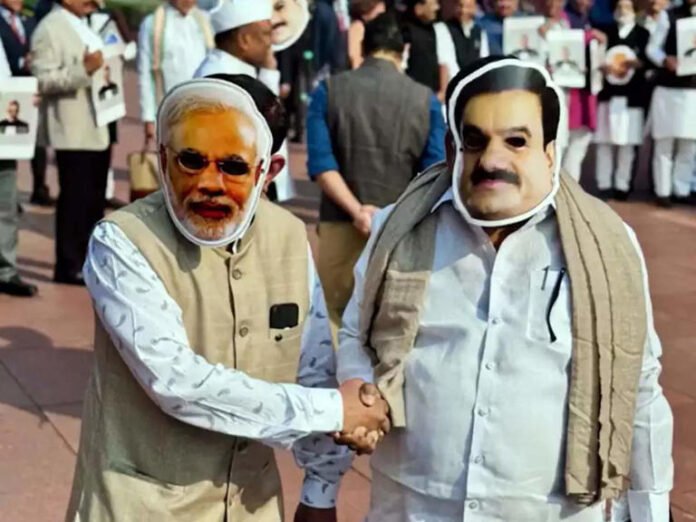On December 9, 2024, Rahul Gandhi, a prominent Congress leader and a relentless critic of Prime Minister Narendra Modi, staged a unique protest outside the Indian Parliament. The event took the form of a satirical “mock interview,” targeting Modi and billionaire industrialist Gautam Adani, amidst fierce opposition protests over allegations of corruption and cronyism involving the Adani Group. This performance marks a significant moment in Indian politics, as opposition parties intensify their demand for accountability from the ruling BJP government.
The Mock Interview: A Political Satire
In a dramatic display, Gandhi set up a makeshift interview outside Parliament, with opposition MPs wearing masks symbolizing Modi and Adani. As Gandhi posed pointed questions, the masked figures responded with exaggerated camaraderie, claiming, “We do everything together. We have had a relationship for years.” The sarcastic tone underscored allegations of a close and questionable nexus between Modi’s government and Adani, a topic that has long been a point of contention for the opposition.
The performance was more than a theatrical act; it was a calculated political move aimed at drawing public attention to the opposition’s allegations. Through humor and satire, Gandhi sought to highlight what he calls a systematic undermining of democratic principles and an erosion of accountability in governance under Modi’s leadership.
Context of the Protests
The mock interview occurred amidst heightened tensions in Parliament, where the Lok Sabha has faced repeated disruptions due to opposition-led protests. These protests center on allegations of bribery involving the Adani Group in the United States, a controversy that has reignited debates about corporate influence in Indian politics.
The opposition has demanded a thorough parliamentary discussion on the issue and transparency regarding investigations into Adani’s financial dealings. They argue that the government’s reluctance to address these concerns reflects an attempt to shield powerful allies from scrutiny. For Gandhi, this mock interview was a way to amplify these demands, connecting with the public through a visually striking and memorable protest.
Rahul Gandhi’s Critique of Modi
Gandhi used the opportunity to reiterate his criticism of Modi, accusing him of avoiding parliamentary debates and accountability. He alleged that Modi’s close ties with Adani undermine democratic processes and allow unchecked corporate influence. Gandhi’s social media posts accompanying the event emphasized what he described as a “decades-old relationship” between Modi and Adani, framing the issue as a symptom of larger systemic corruption.
This critique aligns with Gandhi’s broader political strategy to position Congress as the defender of democratic values and public accountability. His focus on the Modi-Adani connection has become a cornerstone of his campaign to rally opposition forces and gain public support.
Political Reactions
The BJP swiftly dismissed Gandhi’s mock interview as a publicity stunt, accusing him of trivializing serious parliamentary proceedings. BJP leaders argued that such theatrics distract from substantive debates and undermine the dignity of Parliament. They reiterated that the allegations against Adani are baseless and politically motivated.
On the other hand, opposition leaders praised Gandhi’s boldness, describing the mock interview as a creative way to shed light on critical issues. They argue that traditional methods of protest often fail to capture public attention, and Gandhi’s approach effectively communicates their concerns to a wider audience.
Public Response and Media Coverage
The public’s reaction to Gandhi’s protest has been mixed. While some praised his innovative approach and commitment to challenging the status quo, others criticized it as mere political grandstanding. Social media platforms have been abuzz with debates, memes, and commentary, reflecting the polarizing nature of Gandhi’s actions.
Media coverage has also varied, with some outlets focusing on the substance of the allegations and others highlighting the performative aspect of the protest. The event has undoubtedly succeeded in reigniting conversations about corporate governance, political accountability, and the role of satire in political discourse.
The Broader Implications
Gandhi’s mock interview is emblematic of a larger shift in Indian political protest. In an era dominated by visual media and social networks, traditional methods of dissent often struggle to gain traction. By staging a dramatic and satirical protest, Gandhi not only captured headlines but also engaged a younger, media-savvy audience.
This protest also underscores the evolving relationship between opposition parties and the BJP-led government. The increasing use of innovative protest methods suggests a recognition among opposition leaders that they must adapt to the changing dynamics of political communication to remain relevant.
Rahul Gandhi’s mock interview outside Parliament was more than a political stunt; it was a strategic move to draw attention to pressing issues and challenge the government’s accountability. By blending humor with sharp critique, Gandhi demonstrated a willingness to innovate in his approach to opposition politics.
The event has added another layer to the ongoing debate about transparency, corporate influence, and the health of Indian democracy. As the controversy around Adani continues to unfold, Gandhi’s protest serves as a reminder of the power of satire and symbolism in shaping political narratives. Whether it translates into tangible political gains remains to be seen, but for now, it has firmly placed the Modi-Adani issue at the center of India’s political discourse.



